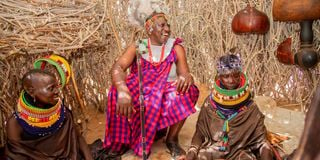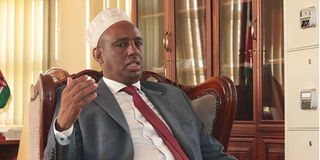Premium
President Ruto to lead annual Lake Turkana Festival on Saturday

President William Ruto when he attended the Turkana Cultural and Tourism Festival in Lodwar town in October.
The annual Lake Turkana Cultural Festival, which brings together communities from Marsabit County and neighbouring areas, will begin on Saturday, November 23, in Loiyangayani town.
The festival, which is expected to be attended by President William Ruto on, aims to unite local communities, promote diversity and boost tourism.
Local and international tourists have flocked to the normally sleepy Lake Turkana town of Loiyangayani for the event. The town is home to the El Molo, an endangered fishing community.
As well as showcasing and celebrating their culture through music and dance, the communities also display their traditional items and food.
The first festival was held in 2008 and brought together all 15 communities living in the county and in neighbouring Ethiopia, some of which have been at odds due to frequent skirmishes over water and pasture for their cattle.
Marsabit Governor Mohamud Ali, whose administration played a key role in organising the event, said all was set for the 13th edition, which will also focus on tackling climate change.
Marsabit, Kenya's largest county in terms of land area, usually faces prolonged drought, but is currently struggling with the effects of heavy rains that have hit the region.
"We want to make this the most successful cultural celebration so far to preserve our culture and also promote peace among communities," said Governor Ali.
The rains have uprooted thousands of people from their homes and left them in desperate need of humanitarian aid.
The flooding caused by the rains has also swept away hundreds of livestock.
The region is also home to the smallest indigenous community in Kenya - El Molo.
The El Molo community has been the hardest hit in Marsabit due to the rising water levels and flooding, and their children are suffering from malnutrition as fish, their staple food, continues to dwindle in the lake.

Marsabit Governor Mohamud Ali.
Organisers say that while the festival celebrates and helps preserve the cultures of the Turkana, Dassanach, Samburu, El Molo, Gabbra, Rendile, Borana, Watta and Pokot communities, it also focuses on economic growth.
Under the theme 'Celebrating Cultural Diversity for Sustainable Peace', the Marsabit government is optimistic that the festival will promote peace, cohesion, integration and harmony among the 15 communities in the region.
Marsabit Deputy Governor Solomon Gubo told a press briefing on Wednesday that although culture is negatively affected by climate change, it is largely untapped in climate change adaptation.
In Marsabit, climate-related disasters such as perennial droughts and flash floods have become frequent, causing acute food insecurity, which is one of the underlying causes of ethnic conflicts and other socio-economic upheavals.
Beyond the impact of climate change at the intersection of education, health, food security and science, among others, culture is an element that is still largely underestimated.
With this in mind, Mr Gubo emphasised the importance of culture as a key tool in the fight against climate change.
Pastoralists, marginalised and minority communities such as El Molo are already under stress due to the rapidly changing environment in which they live.
Mr Gubo revealed that the devolved unit would use the cultural festival as the main platform to launch the county's 2024/25 Climate Change Action Plan.
He added that cultural policies could also be reviewed or redesigned to help accelerate climate change.
This comes a year after the region emerged from one of the worst ethnically motivated killings and conflicts in the region between 2019 and 2021.
Climate change has been cited as one of the main drivers of the ethnic conflicts, which left more than 500 people dead in three years as herders fought over scarce resources such as water and pasture.
Jeremy Ledany, Marsabit Culture and Tourism Executive, underlined the need to strengthen support for cultural resilience to climate change through mass public awareness and capacity building.
He hoped that the Lake Turkana Cultural Festival would provide an appropriate platform by drawing on the diverse cultures of the community to provide valuable lessons for climate change mitigation and adaptation strategies.
The cultural festival is seen as a key factor in raising awareness and promoting dialogue on climate change mitigation and adaptation.
The devolved unit expects to use the festival to promote sustainable use of available scarce natural resources, responsible production and consumption standards.
The Lake Turkana Cultural Festival is held on the scenic shores of the lake.





